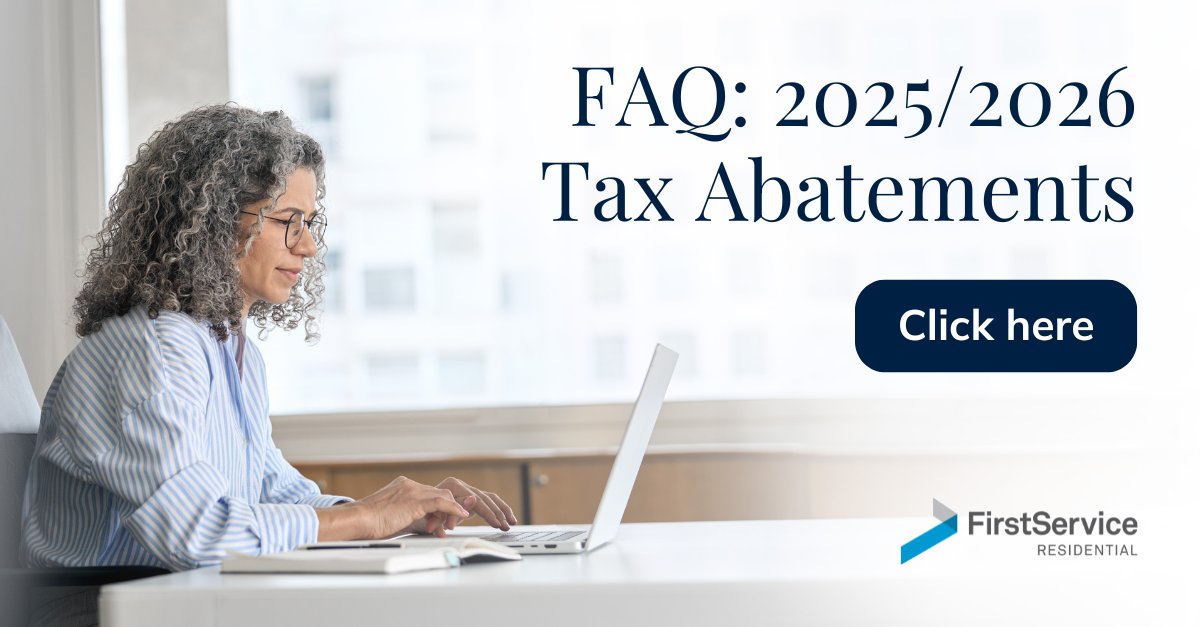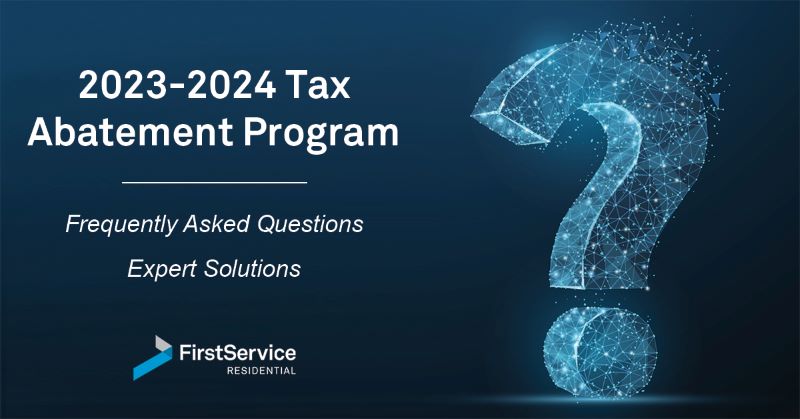Friday December 09, 2022
UPDATE: This article does not pertain to the latest tax abatement cycle. Click here for 2025/2026 tax abatement updates.

Condominium owners and cooperative shareholders who meet the eligibility requirements for the Cooperative and Condominium Property Tax Abatement can have their annual property taxes reduced. The amount of the abatement is based on the average assessed value of the residential units in the development. As mortgage interest rates and operating costs continue to rise, condominium owners and cooperative shareholders rely on tax abatements to offset their expenses.
To help owners and shareholders navigate requirements for the 2023-2024 tax abatement cycle, our experts answered the most frequently asked questions.

Do all shareholders/unit owners need to complete the online tax abatement questionnaire?
Only shareholders/unit owners who use the apartment as a primary residence and fall under any of the below categories need to respond:- Shareholders/unit owners who purchased after January 5, 2022.
- Shareholders/unit owners who had a change in primary residence status since January 1, 2022.
- Shareholders/unit owners who had a change in ownership (i.e., transfer to a trust, addition or removal of an owner, name change) since January 1, 2022.
- Shareholders/owners who did not previously receive the tax abatement on their maintenance bill during the 2022 year (cooperatives) or on their most recent tax bill (condominiums).
- Shareholders/unit owners with an expiring tax exemption (i.e., 421a, 421g, J51) who need to apply for the first time.
How can I respond?
To accelerate the abatement process, FirstService Residential provides our clients with an online portal to submit questionnaire responses. Basic fields are auto-populated to help make the process easy and convenient.To protect private, personally identifiable information, certain fields will never auto-populate including:
- First and Last Name
- Social Security Number
- Purchase Date
I own multiple units but only received a notification for one apartment. How do I respond for my additional apartments?
If your apartments are not legally combined (one maintenance/common charge statement), you need to respond for each unit that you use as a primary residence.Do I need to submit a response for my parking or storage space?
No, only residential apartments are eligible for the abatement program.What do I enter for “Date of Purchase”?
Owners should enter the date they purchased the unit.If I do not know my purchase date, what do I enter?
If you purchased prior to 2022, please enter your best estimate. If you purchased in 2022, you must be as specific as possible as it could impact your eligibility.What happens if my submission does not go through immediately?
If you are trying to submit and the webpage is processing for more than a minute, refresh the website, go back to the main page, and try again. This typically corrects the issue when the submission does not go through immediately.How do I know my response was submitted?
Upon completion of the form, you will receive a notification that indicates your submission has been received. The notification will state “Thank you for your submission for the 2023/24 tax abatement.”What is the deadline to submit my response?
Submissions will be accepted through January 13, 2023. Late submissions will not be accepted.What happens if my building decides to opt-out of paying prevailing wage?
Buildings are required to pay prevailing wage to remain in the abatement program. If your building opts-out of paying prevailing wage for the upcoming tax year, shareholders/unit owners will not be eligible for that year. The building can decide to opt-in for future years and shareholders/unit owners that meet all necessary criteria will become eligible for the abatement.Who should I contact if I have any questions?
You will receive confirmation that your submission has been recorded. If there are additional unit specific abatement inquires, they may be submitted via email to [email protected]. Should you have any questions regarding your online registration, please contact our Customer Care Center at 212.634.8911.How do unit owners/shareholder apply for other personal exemptions?
New York State (NYS) and the New York City Department of Finance (DOF) administer a number of tax exemptions and abatements for seniors, veterans, clergy members, people with disabilities, and other homeowners. These benefits can lower your property tax bill. For eligibility information, please visit the DOF website. Please note that to qualify for any personal exemption/abatement, you, as the homeowner, must apply directly via the applicable links below:- DOF Basic and Enhanced School Tax Relief (STAR)
- DOF Senior Citizen Homeowners’ Exemption (SCHE)
- DOF Disabled Homeowners’ Exemption (DHE)
- DOF Clergy Exemption
- NYS Veterans’ Exemptions
FAQ: The Impacts of New York City’s Prevailing Wage Law on Condominium & Cooperative Properties
Beginning July 1, 2022, condominium and cooperative buildings in New York City must begin to pay building workers a prevailing wage or forfeit their eligibility for the Cooperative and Condominium Property Tax Abatement. The amendment was signed into law by Governor Kathy Hochul on September 6, 2021 and specifically applies to multifamily condominium and cooperative properties with an average assessed value of $60,000 or more.If the building has less than 30 units, the average assessed value per unit must be more than $100,000 for the prevailing wage requirement to apply. For a condominium property, the average assessed value is the sum value of all units divided by the total number of units. For co-ops, a single average assessed value is assigned to the entire building.
Click here to learn more about the impact of the Prevailing Wage Law on New York City condos and co-ops.
To help our managed properties navigate the intricacies of the new prevailing wage law, FirstService Residential hosted a live Q&A with Michael Wolfe, president of property management, Ben Kirschenbaum, vice president and general counsel, and Stephanie Cardello, vice president of compliance.
Click here to watch a full replay of the event.
Supporting Our Properties with Unmatched Resources
New York City’s web of local laws and regulations is increasingly complex, often requiring expertise that falls outside the purview of a property manager. At FirstService Residential, our property managers have the support of an in-house network of subject matter experts and third-party consultants who are regarded as the industry’s brightest leaders. Our experts include Michael Wolfe, president of property management at FirstService Residential, who also serves as president of REBNY’s Residential Management Council. Ben Kirschenbaum, our general counsel, is also an active member of the REBNY Council and works with New York City legislators and attorneys to help shape and protect the interests of condominium and co-op boards across the region. Both are actively communicating with the city’s Department of Finance regarding the promulgation of the new rules to enforce the changes in the law.Additional In-House Experts Include:
- Budget Preparation and Implementation Drawing on decades of experience, our financial experts continuously monitor shifting market trends and proactively identify solutions to protect your most valued asset. We offer personalized roadmaps for the continued financial success of your property, especially in times of market volatility and crisis, and help develop effective budgets that are supported by timely, comprehensive monthly reports with forecasts of future cash flow, expense tracking and more.
- Local Law Compliance Our dedicated Compliance Department proactively resolves complaints and violations, coordinates permit and licensure renewals and tracks the status of mandated inspections on a daily basis. This includes new and future regulations dictating prevailing wages and tax abatements.
- Tax Certiorari and Protest Services Our clients have access to the experts at Goldstein Weprin Finkel Goldstein, a premier tax certiorari firm. This partnership has enabled our clients to save millions of dollars on real estate tax assessments, as well as the legal fees associated with tax protests.
- Education Programs for Property Managers
To keep our property managers at the forefront of our industry, we regularly host educational sessions led by in-house and local experts on a range of topics that impact the fiscal health of our managed buildings and our boards. Our ongoing training programs are designed to share best practices that enhance day-to-day building operations, ensure compliance with local laws, and consistently deliver the highest level of service.